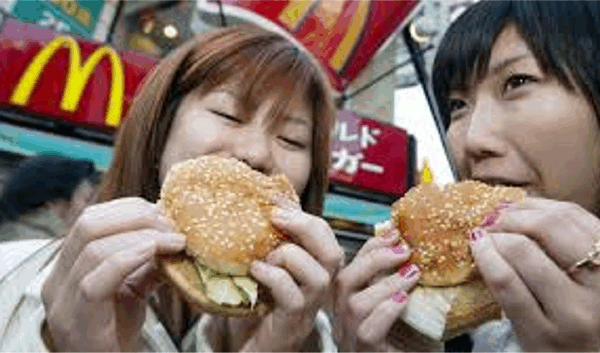새로운 리뷰에서는 정크푸드와 32가지 건강 문제에 대해 우리가 알고 있는 내용을 공개합니다.
아니카 버제스
게시일 2024년 3월 1일 금요일 오전 10시 14분 2024년 3월 1일 금요일 오전 10시 14분
도넛
새로운 연구에서는 정크푸드가 30가지 이상의 다양한 건강 문제를 일으킬 위험이 더 높다는 사실을 연관시켰습니다.(Pixabay)
우리는 정크푸드가 우리에게 나쁘다는 말을 오랫동안 들어왔습니다.
그러나 선도적인 호주 및 국제 기관 전문가들의 새로운 검토는 인스턴트 국수, 감자칩, 패스트푸드 및 즉석식품으로 구성된 식단이 얼마나 해로울 수 있는지를 밝혀줍니다.
연구자들은 지난 3년 동안 거의 천만 명의 참가자가 참여한 45개의 이전 연구 결과를 조사했습니다.
동종 최대 규모의 리뷰로 간주되는 연구자들은 초가공 식품을 섭취하면 신체적, 정신적 측면 모두에서 32가지 건강 문제가 발생할 위험이 더 높아질 수 있으며 심지어 조기 사망에까지 이를 수 있다는 “강력한 증거”를 발견했습니다.
BMJ에 발표된 연구는 “어려운 현실”을 드러내는 “놀라운 통계”라고 부르는 이후 UN 기관들이 더 강력한 조치를 취할 것을 촉구하고 있습니다.
그리고 전문가들은 호주와 같은 국가에서도 흡연을 억제하는 데 사용되는 유사한 조치를 채택하기를 원합니다.
그들이 발견한 내용을 풀어봅시다.
초가공식품이란 무엇인가요?
우산 검토에서는 초가공 식품(UPF)을 정의하기 위해 Nova 식품 분류 시스템을 사용했습니다.
Nova는 산업 가공의 성격, 범위 및 목적에 따라 식품을 분류하는 것을 목표로 널리 사용되는 시스템입니다.
UPF는 포장 스낵, 청량 음료, 인스턴트 국수, 즉석 식품을 포함하여 다양한 즉석 식품으로 분류됩니다.
연구원들은 또한 포장된 구운 식품, 아이스크림, 달콤한 시리얼, 칩, 사탕, 비스킷과 같은 식품을 구체적으로 언급했습니다.
이러한 유형의 제품은 “산업용 제제”로 특징지어집니다.
건강에 해로운 음식과 간식
검토 결과, 초가공식품 섭취가 늘어나면 건강에 해로운 결과가 발생할 위험이 더욱 증가하는 것으로 나타났습니다.(ABC News: Clare Rawlinson)
본질적으로 UPF는 “상당한 가공을 거쳐 더 이상 원재료와 유사하지 않은 식품으로 구성된 제품”이라고 Central Queensland University의 Appleton Institute의 Charlotte Gupta는 말했습니다.
UPF는 주로 식품에서 추출한 화학적으로 변형된 물질과 맛, 질감, 외관 및 내구성을 향상시키는 첨가제로 구성되며 전체 식품은 최소한으로 포함됩니다.
또한 첨가된 설탕, 지방, 소금 함량이 높고 비타민과 섬유질 함량이 낮은 경향이 있습니다.
호주인들은 초가공식품을 얼마나 섭취하나요?
전 세계 UPF 판매 데이터 및 소비 분석을 바탕으로 이 리뷰에서는 점점 더 초가공 가공된 글로벌 식단으로 전환하고 있다고 밝혔습니다.
전문가들은 우리가 초가공 식품에 의존하게 되었다고 말합니다. 어떻게 여기까지 왔어?
초가공 식품은 그 어느 때보다 평균 호주인의 식단에서 더 많은 부분을 차지하고 있습니다.
한 사람이 슈퍼마켓이나 편의점에서 칩 한 봉지를 살펴보고 있습니다.
더 읽어보세요
그러나 국가와 지역별로 상당한 차이가 있었다.
호주와 미국을 포함한 고소득 국가에서는 UPF에서 파생된 식이 에너지의 비율이 각각 42%와 58%에 이릅니다.
조지 글로벌 보건 연구소(George Institute for Global Health)의 연구원이자 공인 영양사인 데이지 코일(Daisy Coyle)은 “첨가물이 많이 들어가고 때로는 필수 영양소가 부족한 초가공 식품이 호주 식단에 널리 퍼져 있습니다.”라고 말했습니다.
“사실 우리가 슈퍼마켓에서 구매하는 것의 거의 절반을 차지합니다.”
UPF의 총 에너지 섭취량은 이탈리아와 한국에서 각각 10%, 25%로 낮은 것으로 나타났다.
반면 콜롬비아, 멕시코 등 저소득 및 중간소득 국가의 경우 총 에너지 섭취량은 16~30% 범위였습니다.
정크 푸드가 우리를 위험에 빠뜨리는 것은 무엇입니까?
전반적으로, 검토에서는 UPF에 대한 노출이 높을수록 건강에 해로운 결과가 발생할 위험이 증가하는 것과 지속적으로 연관되어 있음을 발견했습니다.
여기에는 암, 주요 심장 및 폐 질환, 정신 건강 장애, 조기 사망 등이 포함됩니다.
연구진은 이런 종류의 연구는 “정크푸드가 건강 문제를 일으킨다는 것을 증명할 수 없다”고 강조했습니다.
그러나 그들은 이러한 유형의 정크 푸드가 “모든 원인의 사망 및 특정 건강 상태와 관련이 있다”는 일관된 증거가 있다고 말합니다.
시드니 대학의 컨설턴트 영양사이자 영양학자인 Alan Barclay는 호주 과학 미디어 센터에 보낸 성명에서 “이러한 연관성은 흥미롭고 더 높은 수준의 연구를 보장하지만 인과관계에 대한 증거를 제공하지 않으며 제공할 수도 없습니다”라고 말했습니다.
이 리뷰에서는 정크푸드 섭취량이 증가하는 것과 관련이 있다는 “확실한 증거”를 발견했습니다.
심혈관 질환 관련 사망 위험이 약 50% 증가합니다.
불안 및 일반적인 정신 장애 위험이 48~53% 더 높습니다.
제2형 당뇨병 발병 위험이 12% 더 높습니다.
다음에 대한 “매우 암시적인 증거”가 있었습니다.
어떤 원인으로든 사망할 위험이 21% 더 높습니다.
다음과 같은 위험이 40~66% 증가합니다.
심장병 관련 사망, 비만, 제2형 당뇨병, 수면 문제
우울증 위험이 22% 증가합니다.
Coyle 박사는 “통계는 충격적입니다. 이러한 음식은 심장 질환이나 정신 건강 장애로 인한 사망 위험을 두 배로 늘릴 수 있습니다.”라고 말했습니다.
UPF와 천식, 위장 건강, 심장 대사 질환 사이의 연관성에 대한 증거도 있었지만 증거는 제한적이었습니다.
연구자들은 포괄적 검토에 한계가 있음을 인정했으며 UPF 섭취를 평가하는 다른 요인과 변형이 결과에 영향을 미칠 수 있는 가능성을 배제할 수 없었습니다.
호주는 정크푸드에 대해 담배 접근 방식을 취해야 합니까?
연구원들은 이번 연구 결과가 초가공 식품 소비를 최소화하기 위한 긴급한 연구와 공중 보건 조치를 요구한다고 말했습니다.
그들은 유엔 기관들이 담배에 취해지는 접근 방식과 유사한 프레임워크를 고려하기를 원합니다.
예를 들어, 식품 포장에 경고 라벨을 붙이고, 광고를 제한하고, 학교 근처에서 정크푸드 판매를 금지하는 것입니다.
담배갑과 라이터
전문가들은 이제 정크푸드를 담배처럼 취급하고 사람들의 제품 구매를 억제해야 할 때라고 말합니다.(ABC 뉴스: Nic MacBean)
현재 호주에는 기업들이 식품에서 소금, 설탕, 지방 함량을 줄이도록 장려하는 자발적인 프로그램이 있습니다.
식품에도 건강 별 등급이 있지만 약 40%의 제품만이 라벨을 가지고 있다고 코일 박사는 ABC에 말했습니다.
그녀는 이러한 조치를 시행하고 의무화하기 위해 더 많은 조치가 필요하다고 말했습니다.
“호주의 기존 영양 정책으로는 이 문제를 해결하기에 충분하지 않습니다.”라고 그녀는 말했습니다.
“우리는 자발적인 조치를 취해왔지만 효과가 없으며 변화가 보이지 않습니다. 호주는 건강한 방향으로 가고 있지 않습니다.”
이 시스템에 따라 포장 식품에는 영양 프로필에 따라 별 등급이 부여됩니다.(healthstarating.gov.au)
담배갑에 붙이는 것과 같이 음식에 경고 라벨을 붙이는 것은 남아메리카와 같은 곳에서 효과적이라고 코일 박사는 말했습니다.
소비자가 건강에 해로운 제품을 구매하지 못하도록 고안되었기 때문에 기업이 식품을 개선하도록 압력을 가합니다.
“회사들은 예를 들어 소금과 설탕의 양을 줄이기 위해 제품에 이를 넣기를 원하지 않습니다.”라고 그녀는 말했습니다.
ABC는 호주 식품 및 식료품 위원회에 의견을 요청했습니다.
연구원들은 또한 신선하고 건강한 음식에 대한 가용성과 접근성에 대해 더 많은 고려가 필요하다고 말합니다.
그리고 가공되지 않거나 최소한으로 가공된 식품을 재배, 제조, 판매하는 가족 농민과 독립 기업에 더 많은 지원이 제공되어야 합니다.
게시일: 2024년 3월 1일
New review unpacks what we know about junk food and 32 health issues
Posted Fri 1 Mar 2024 at 10:14amFriday 1 Mar 2024 at 10:14am
We have long been told that junk food is bad for us.
But a new review by experts at leading Australian and international institutions sheds light on just how damaging a diet of instant noodles, chips, fast food and ready-made meals can be.
The researchers delved into the results of 45 previous studies, published over the past three years, involving almost 10 million participants.
Considered the largest review of its kind, researchers found “strong evidence” that eating ultra-processed foods can put you at higher risk of 32 different health problems, both physical and mental — and even early death.
After what they call “staggering statistics” that reveal “a troubling reality”, the research, published in the BMJ, is calling for UN agencies to take stronger action.
And the experts want countries like Australia to adopt similar measures used to curb smoking.
Let’s unpack what they found.
What are considered ultra-processed foods?
The umbrella review used the Nova food classification system to define ultra-processed foods (UPF).
Nova is a widely used system that aims at classifying food products according to the nature, extent and purpose of industrial processing.
It classes UPFs as a broad range of ready-to-eat products, including packaged snacks, soft drinks, instant noodles, and ready-made meals.
Researchers also specifically mentioned foods such as packaged baked goods, ice-cream, sugary cereal, chips, lollies and biscuits.
These types of products are characterised as “industrial formulations”.
Essentially, UPFs are “products made up of foods that have undergone significant processing and no longer resemble the raw ingredients,” said Charlotte Gupta from the Appleton Institute at Central Queensland University.
UPFs are primarily composed of chemically modified substances extracted from foods, along with additives to enhance taste, texture, appearance and durability, with minimal to no inclusion of whole foods.
They also tend to be high in added sugar, fat, and salt, and low in vitamins and fibre.
How much do Australians consume ultra-processed foods?
Based on analyses of worldwide UPF sales data and consumption, the review said there was a shift towards an increasingly ultra-processed global diet.
Experts say we’ve become dependent on ultra-processed foods. How did we get here?
Ultra-processed foods are making up more of the average Australian’s diet than ever before.
However, there were considerable differences across countries and regions.
In high-income countries including Australia and the US, the share of dietary energy derived from UPFs ranges from 42 per cent and 58 per cent, respectively.
“Ultra-processed foods, laden with additives and sometimes lacking in essential nutrients, have become ubiquitous in the Australian diet,” said Daisy Coyle, research fellow and accredited practising dietitian at The George Institute for Global Health.
“In fact, they make up almost half of what we buy at the supermarket.”
The total energy intake from UPFs was as low as 10 per cent and 25 per cent in Italy and South Korea, the review found.
Whereas, for low- and middle-income countries such as Colombia and Mexico, the total energy intake ranged from 16 to 30 per cent.
What are junk foods putting us at risk of?
Overall, the review found that higher exposure to UPFs was consistently associated with an increased risk of 32 adverse health outcomes.
These include cancer, major heart and lung conditions, mental health disorders, and early death.
The researchers stressed that this kind of study “cannot prove the junk food is causing the health problems”.
However, they say there is consistent evidence that these types of junk foods are “associated with death of any cause” and specific health conditions.
“While these associations are interesting and warrant further high quality research, they do not and cannot provide evidence of causality,” Alan Barclay, a consultant dietitian and nutritionist from the University of Sydney, said in a statement to the Australian Science Media Centre.
The review found “convincing evidence” higher junk food intake was associated with:
- About a 50 per cent increased risk of cardiovascular disease-related death
- A 48 to 53 per cent higher risk of anxiety and common mental disorders
- A 12 per cent greater risk of type 2 diabetes
There was “highly suggestive evidence” for:
- A 21 per cent greater risk of death from any cause
- A 40 to 66 per cent increased risk of heart disease-related death, obesity, type 2 diabetes, and sleep problems
- A 22 per cent increased risk of depression.
“The statistics are staggering – these foods may double your risk of dying from heart disease or from developing a mental health disorder,” Dr Coyle said.
There was also evidence for associations between UPFs and asthma, gastrointestinal health, and cardiometabolic diseases but the evidence was limited.
The researchers acknowledged that there were limitations with an umbrella review and they couldn’t rule out the possibility that other factors and variations assessing UPF intake may have influenced their results.
Does Australia need to take a tobacco approach to junk food?
The researchers say the findings call for urgent research and public health actions to minimise ultra-processed food consumption.
They want United Nations agencies to consider a framework similar to the approaches taken to tobacco.
For instance, including warning labels on food packaging, restricting advertising and banning junk food being sold near schools.
Currently, Australia has voluntary programs which encourage companies to cut the salt, sugar and fat level from their foods.
There are also health star ratings on foods, but only around 40 per cent of products carry the labels, Dr Coyle told the ABC.
She said more needs to be done to enforce these measures and make them mandatory.
“Existing nutrition policies in Australia aren’t enough to tackle this problem,” she said.
“We’ve put up with voluntary measures and they don’t work we don’t see changes … Australia is not going in a healthy direction.”
Putting warning labels on food, like what we have on cigarette packets, has been effective in places like South America, Dr Coyle said.
Because they are designed to put consumers off purchasing unhealthy products, they put pressure on companies to make improvements to their food.
“Companies don’t want to put them on their product so they cut levels of salt and sugar, for instance,” she said.
The ABC has reached out to the Australian Food and Grocery Council for comment.
Researchers say there also needs to be more consideration around availability and access to fresh and healthy food.
And more support should be provided to family farmers, and independent businesses that grow, make, and sell unprocessed or minimally processed foods.
Posted 1 Mar 2024










